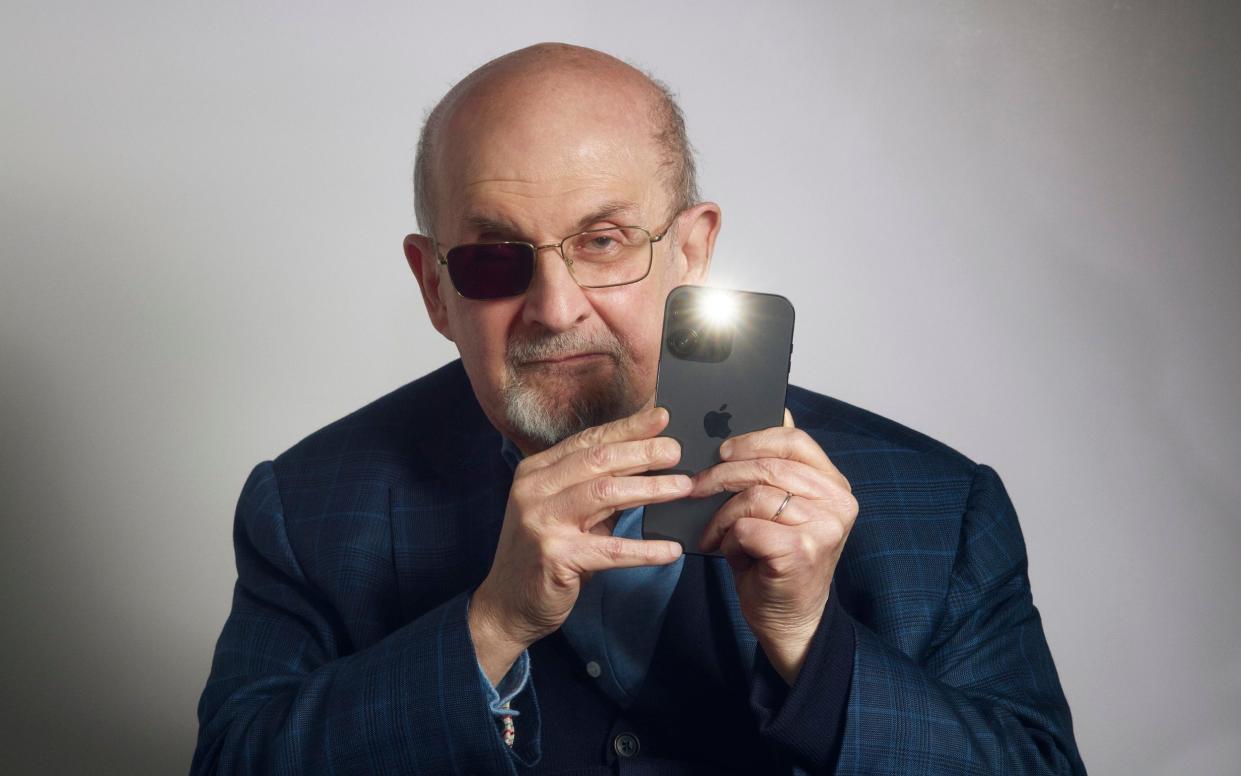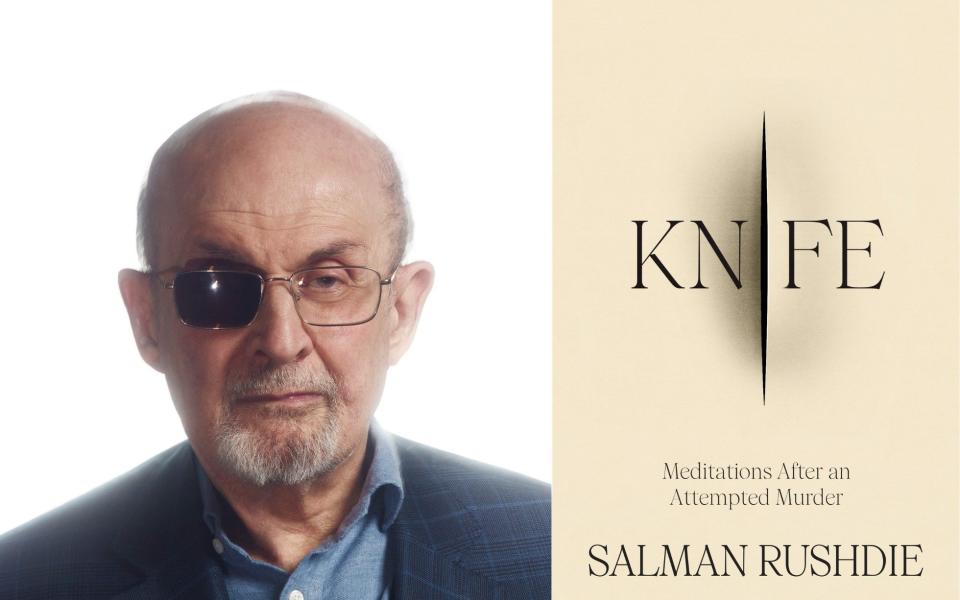‘We are in danger of becoming too thin-skinned’: Salman Rushdie answers Telegraph reader questions

Has the near-death experience changed your writing style and did [writing Knife] prove cathartic? (From Richard Langron)
Writing style is, at its best, the servant of the subject at hand, whether fiction or nonfiction. Knife is written in a spare, stripped-down style because the matter demanded plain speaking, direct and (I hope) thoughtful, but without any baroque flourishes. Over the years I have always tried to fit the style to the story. In Midnight’s Children I wanted to use an Indianized English.
In The Enchantress of Florence the writing is more ornate, and tries to reflect the kinds of books (the “Hamzanama” stories in India, or Ariosto’s “Orlando Furioso” in the Italian Renaissance) that the characters in the book might have read and enjoyed. In Shalimar the Clown the writing is leaner, more realistic, darker, as befits a murder story. So, no, the near-death experience will not change my writing style. But it certainly gave me information I didn’t have before. And writing Knife felt like taking control of the narrative, and yes, that felt good.
Who are the novelists you most admire? (From Jason Harvey)
Big question, not enough room to answer it fully. But here’s a list of a few. Joyce, Kafka, Proust, Woolf, Dickens, (Mary) Shelley, and, among more recent writers, Bellow, Calvino, García Márquez, and perhaps above all the glorious Toni Morrison. The first book of hers I read was the incandescent Song of Solomon and I immediately thought, I have to read every word this woman has written and will write.
One of my proudest moments was interviewing her for BBC TV’s The Late Show when she published her novel Jazz. I should also say that I’m happy to have been part of a fascinating generation of writers in Britain – Ian McEwan, Angela Carter, Martin Amis, Kazuo Ishiguro, Jeanette Winterson, et al. Not a bad club to belong to, even though I am not a great joiner of clubs.
Do you think the novel is still a significant artistic form, and will it survive innovations in AI? (From Joe Burgis)
Well, I have to think so, don’t I? But there are so many great writers doing great work – Haruki Murakami, Margaret Atwood, Jesmyn Ward, James McBride, so many more – that the novel would appear to be in rude good health. McBride’s latest, the wonderful Heaven & Earth Grocery Store, has sales exceeding one million copies in hardcover in the US alone, which suggests that the readers are still out there, and will show up when excited by the real thing.
As for AI, I am trying very hard to learn nothing about it. I have never tried to use ChatGPT and hope to keep that record intact. There are advantages to getting older. I’m glad I’m not just starting out in my early 20s and having to think about this sort of thing.
I much enjoyed your appearances in Curb Your Enthusiasm and Bridget Jones. Which TV shows - or indeed books, films, or plays – have most entertained you, and why? (From Sarah Davies)
Oh, so many. I loved the French thriller series Lupin because, well, it thrilled, and featured a charismatic, star-is-born performance from Omar Sy. As a chess lover, I also inhaled The Queen’s Gambit – with another star-is-born performance, from Anya Taylor-Joy. I am obsessed with the long-running Law & Order series – formulaic, yes, but often shockingly topical, and with a deep knowledge of the streets of New York.
The South Korean Netflix series Extraordinary Attorney Woo, about a brilliant young autistic lawyer, was irresistible, and I kind of fell in love with its leading actress, Park Eun-Bin. But my all-time favourite of recent years has to be the spy series Slow Horses, based on Mick Herron’s novels about the worst spies in England, and featuring a magnificently decrepit performance by Gary Oldman. And you didn’t ask but my least loved series were that travesty of a Tolkien saga whose name I have intentionally forgotten, and The Crown, which unfortunately I can’t forget.
What is on your bedside table? (From Gay Campbell)
I have hugely enjoyed Amitava Kumar’s My Beloved Life, in which India and America are both so vividly alive. Also Srinivas Reddy’s Anthology of Classical Indian Literature, which will, I hope, introduce modern readers to some of the riches of Indian writing. I’m also lucky in that I get sent early copies of forthcoming books. One to look out for is Talk to Me: Lessons from a Family Forged by History, Rich Benjamin’s extraordinary memoir of a Haitian family mired in intrigues and secrets, with an ancestor who was briefly President before being overthrown and driven into exile by “Papa Doc” Duvalier.
Would you have done anything differently if you could? (From Wai Mak)
It’s an interesting thing to consider, the fork in the road not taken, the road not travelled. I have often wondered who I might have grown up to be and what, if anything, I might have written if, after graduating from Cambridge, I had returned to India and made a life there. Also, I have reflected upon how my later life would have turned out if I hadn’t made my second migration, from London to New York. But on the whole I think it’s pointless to regret one’s big life choices, because the person doing the regretting is the product of those choices; so, in the end, I think I’m happy to settle for the journey I have made, the paths I have taken, and to leave those other possibilities unexplored.

As an author you have endured the most extreme, and quite possibly the first, example of ‘cancel culture’. What do you think about the way publishers (and broadcasters) now seek to censor topics and voices they perceive as ‘problematic’ – for example, through sensitivity readers, offence warnings, highly selective commissioning of new work, and the editing of much-loved classics by authors such as Roald Dahl? How do you think we have ended up here, and will this trend continue? (From Caroline Brennan)
I am on the record as opposing sensitivity readers, trigger warnings, and the bowdlerization of classic books such as those by Roald Dahl, which both my children grew up with and loved. I have no idea if the trend will continue but I will continue to speak out against it. We are in danger of becoming too thin-skinned and also in danger of believing that “being offended” is a sufficient argument for prohibiting the book we claim offends us – an attitude which, if allowed to have its way, would ensure that nothing can be said at all. Let’s all try to have a slightly thicker skin and let a thousand voices speak in different ways.
Had you not become a successful writer what would you have done/become instead? What is the purpose of life? (From Chris Bran)
My only other fantasy was to be an actor. At Cambridge I took part in a lot of student theatre and only contributed a little to university magazines. I played quite a wide range of parts, in Brecht’s Scenes from the Third Reich, Ionesco’s Rhinoceros, and Ben Jonson’s The Alchemist. After I left university in 1968 I dived into the then-flourishing fringe theatre scene in London, mostly at the Oval House in Kennington, where I took part in the anti-war show originated in New York by the Cafe La Mama, Viet Rock, and in another contemporary play, Rainy Day Women, by Dusty Hughes, in which I played an agony aunt, wearing a blonde wig, a long black dress, and a Zapata moustache. Fortunately these experiences showed me that it would be unwise to pursue a thespian career, and I retreated to my literary attic. Oh, and the purpose of life is to put it to good use. We only get one shot at it, so don’t waste it.

Knife: Meditations After an Attempted Murder is published by Jonathan Cape at £20

 Yahoo News
Yahoo News 
